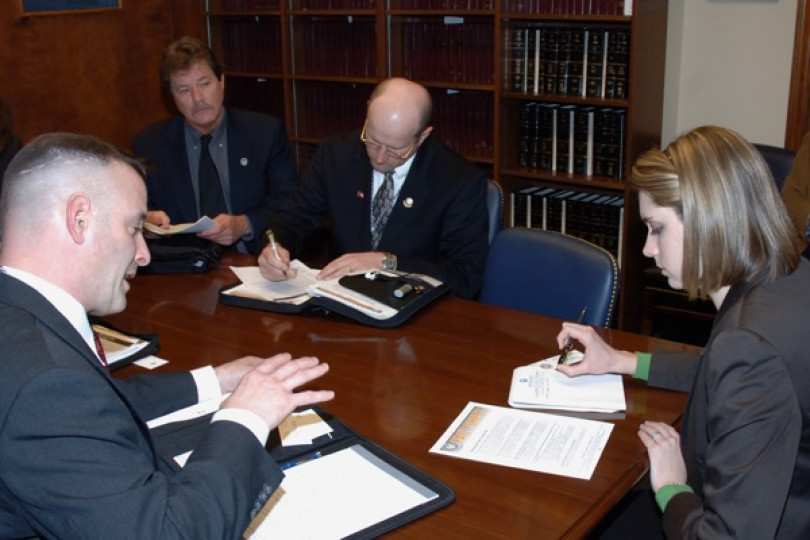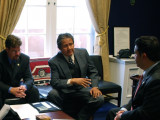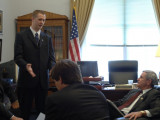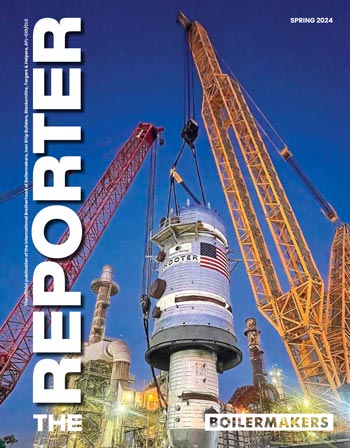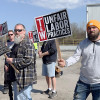Boilermakers lobby hard for other issues, too
THERE WAS NO mistaking what the main issue was during lobbying efforts by Boilermaker delegates at this year’s LEAP conference. One contingent after another sat down with their U.S. representatives, senators, or congressional aides, to stress just how important it is to our union that workers have the right to organize without intimidation and coercion. That is the aim of the Employee Free Choice Act, a bill being considered by Congress.
A majority in the House supports the measure; however, in the Senate, it’s a tougher sell, especially among Republicans and moderate Democrats.
In the office of Sen. Max Baucus (D-MT), Bob Winger of Local 11 (Helena, Mont.) meets with one of the senator’s aides, Tom Lynch. “I know Senator Baucus co-sponsored Employee Free Choice the first time around,” Winger reminds Lynch. “We just need a level playing field.”
IR Jim Cooksey, who is also at the meeting, tells Lynch that for too long employers have had the upper hand in whether or not workers form a union. “People are being brought in to bust the union,” he says. Cooksey stresses that the purpose of the bill is to prevent such abuses.
Things are difficult, too, in the office of Sen. Jeff Sessions (R-AL), where James Wallner, Sessions’ legislative director, and Madeline Barter, a legislative aide, sit down with delegates from Locals 108 (Birmingham, Ala.), 454 (Chattanooga, Tenn.), and 455 (Sheffield, Ala.).
“In the past, he has voted against [Employee Free Choice],” says Wallner. He stresses that the senator wants to make sure that Alabama retains its right-to-work status and that he opposes “taking away the right of employees to a secret ballot.”
Delegate Edwin “Trey” Howard III (L-455) challenges that remark immediately, stating, “That is a misconception that there is no secret ballot.” Howard goes on to explain that the new law would allow recognition of union representation if a simple majority of employees sign cards; however, employees also have the option of requesting a secret ballot vote if they so choose. Delegates repeatedly encounter such misinformation, which has flooded the media and Capitol Hill, thanks to business groups and others who oppose unions.
The Employee Free Choice Act does have many backers. One of them is Rep. Ben Luján (D-NM 3rd). Delegates from Locals 4 (Page, Ariz.) and 627 (Phoenix) hear Luján stress that he is a strong supporter and will vote for the legislation. So will Baron Hill (D-IN 9th). He tells a delegation from Locals 374 (Hammond, Ind.) and D209 (Speed, Ind.), “It’s a slam dunk in the House if the bill clears the Senate.”
The meeting with Hill is one that all delegates like to have, as the congressman supports many of the Boilermakers’ key issues. He tells L-374’s Eric Estes, “I’m a strong advocate of coal. It’s unrealistic for anybody to think coal can’t be a part of the [energy/climate change] solution.”
Like the Employee Free Choice Act, an energy and climate change policy is a vital issue for the Boilermakers. Other key issues include preserving defined-benefit pensions, investing in American shipbuilding, and fixing the health care system. Throughout the lobbying effort on Capitol Hill, delegates strive to cover each issue quickly — but clearly — so legislators know what is most important to Boilermakers and their families.

